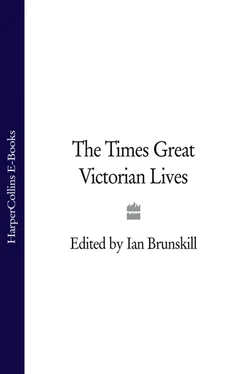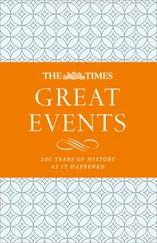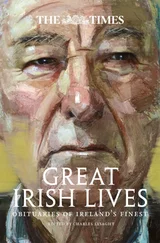Not much is known regarding the early life of Henry John Temple. He was one of the late flowering plants. Always remarkable for his ability, and generally successful in his undertakings, he rejoiced in a splendid constitution, and had to get rid of a certain excess of animal spirits before his ambition could rise to the level of his powers. There is a long period of some five and forty years – considerably more than the half of a man’s life – which Lord Palmerston passed in comparative inactivity, and which is a puzzle to the biographer whose idea of the man is derived from the later glories of his career. To account for this anomaly, it has by some of his eulogists been asserted that he was never at heart a Tory, that he was out of his element in the Ministry of Liverpool and Castlereagh, and that he never truly lived until he escaped from the thraldom of Tory ideas and joined the friends of liberality and progress. This theory is quite unfounded. Lord Palmerston was at the last what he was at the first. There is no real difference between Palmerston Secretary-at-War, Palmerston Foreign Secretary, Palmerston Home Secretary, and Palmerston Prime Minister. The explanation of his backwardness lies wholly on the surface, and is what we have already indicated. He was never what would be called an ambitious man; and, delighting in society, he found in the pleasures of private life what, together with the cares of his particular office, was sufficient in his hot youth, if not fully to occupy his powers, at all events to employ his time. Whatever he had to do he did well, but it is quite evident in his parliamentary history that he never cared to go out of his way for work. As Secretary-at-War for some 20 years, he hardly ever made a speech except on the subject of the army, and then only when he was compelled to do so. As Foreign Secretary for a period little less, he in like manner confined his attention to the business of his own department. At a time when he was the most popular statesman in England, he was content to serve now under his junior, and now under his rival. On the dissolution of the Aberdeen Cabinet he consented to serve even under Lord Derby if certain of his colleagues could be induced to follow the same course. It was not until every possible combination had been tried, and every possible Premier had given up the task in despair, that, as a last resource, Lord Palmerston was asked to form a Government. He at once accepted the position which he had not sought and filled with dignity to himself and advantage to the country an office which, from his never having grasped at it, persons who measure men, not according to their deserts, but according to their demands, regarded as beyond his power.
In the little that is known concerning the early life of Lord Palmerston there is not much that is remarkable. He received his education at Harrow, at Edinburgh, and at Cambridge. He went to Harrow a little after Lord Aberdeen, and about the same time as Sir Robert Peel and Lord Byron. Thence he proceeded to Edinburgh, to enjoy the benefit of Dugald Stewart’s instruction; and, by the way, it may be noted as something peculiar that he was one of the very few Tories who followed the example of the young Whigs of that generation in sitting at the feet of the great Whig Professor of Moral Philosophy and Political Economy. It certainly does not appear that he entered with any enthusiasm into the studies which absorbed every inmate of Stewart’s family; and one might with some show of reason accept it as a proof of this apathy that his name is not to be found among the members of that Speculative Society which was joined by every man of mark in the University, and which, besides Lord Lansdowne, Henry Brougham, Sydney Smith, Francis Jeffrey, Francis Horner, Walter Scott, and Lord John Russell, included Lord Palmerston’s own brother, Sir William Temple. But he himself stated about two years ago in one of his speeches, ‘I passed three years of my youth in studying at the University of Edinburgh, and I will frankly own, without disparagement to any other seat of learning at which I had the fortune to reside, that I enjoyed greater advantages in the acquirement of useful knowledge and sound principles during the three years’ residence in Edinburgh than I possessed at any other place.’ Certainly, the influence of Stewart’s training was at a later period apparent in the strong determination expressed by Lord Palmerston to maintain those principles of government of which Huskisson was the exponent. So long as Huskisson remained in the Cabinet he felt certain that these doctrines would be honoured; when Huskisson was ejected from the Duke of Wellington’s Ministry on purely personal grounds he too seceded, because he had no guarantee, he said, that these doctrines would have the weight to which they were entitled. We may add that it must have been in Stewart’s classroom that a phrase which he often turned to good account in his speeches, and on one memorable occasion with most brilliant effect, first caught his fancy and left upon it an indelible impression –‘The fortuitous concourse of atoms.’ Having been inoculated at Edinburgh, where he remained three years, with these liberal views and this inkling of philosophy, he turned southward again to the University which Pitt represented in Parliament, and which was at that time the chief school of thought in England. Almost all his political contemporaries who took a leading position, whether in the Whig or in the Tory ranks, were Cambridge men. If Byron, Coleridge, and Wordsworth are to be classed among our greatest poets, it would appear that in other departments than that of politics Cambridge had, at the beginning of the present century, a pre-eminence over the sister University of Oxford. Lord Palmerston, who had in the meantime succeeded to his title through the death of his father, entered at St. John’s College in 1803, and worked in good earnest for academical success at a time when it was not usual for a nobleman to present himself for any but an honorary degree.
The Temples were a family predestined to rule. Within the space of 50 years Macaulay has counted among the sons and grandsons of the Countess Temple alone, and she died in 1752, three First Lords of the Treasury (George Grenville, W. Pitt, and Lord Grenville), three Secretaries of State, two Keepers of the Privy Seal, and four First Lords of the Admiralty. Although Lord Palmerston belonged to a different branch of the Temple family, he too, whose father had been a Lord both of the Admiralty and of the Treasury, looked forward to political life, and, in 1806, immediately on the death of Pitt, offered himself to the University of Cambridge as a candidate to represent it in Parliament. He was opposed, on this occasion, by Lord Henry Petty, who had become Chancellor of the Exchequer in room of the ‘heaven-born Minister’ and who thus came to the election with a weight of Ministerial influence which his rival found it vain to withstand. That rival, however, was not to be discouraged. He presented himself again as a candidate in 1807, when he failed of success by only two votes; and in 1811 he tried his fortune a third time, in this case attaining the object of his ambition so unmistakably that he continued to represent the University until, in 1831, he gave mortal offence to his constituents by joining the Whigs. In the meantime, however, he found his way into Parliament, at first through the pocket borough of Bletchingley, and then through the borough of Newport, in the Isle of Wight. Nor was he long in Parliament before he enjoyed the sweets of office. The notorious Ministry of ‘All the Talents’ soon fell to pieces; and, as if in mockery of that splendid coalition, a Ministry succeeded to power headed by a nobleman whose natural incapacity was aided by a natural indolence, and whose indolence was aggravated not only by sickness, but also, to make assurance doubly sure, by continual opiates, under the influence of which he would fall asleep over his papers. Not able to touch animal food, not caring to open his mouth, often found sleeping at his desk, it would be one of the marvels of government that the Duke of Portland contrived to keep a Cabinet together for more than a couple of years, were we not too well acquainted with the truth of Oxenstiern’s commonplace regarding the wisdom of rulers. It was in this singular Ministry, whose great achievement was the Walcheren disaster, that Lord Palmerston first entered upon office. He entered on the office which his father had long enjoyed, as a Lord of the Admiralty; and when, on the quarrel of Castlereagh and Canning on the subject of the Walcheren expedition, the Duke of Portland resigned, and Perceval was called upon to form a Government, Lord Palmerston became Secretary at War. A number of writers, in recording this fact, have fallen into the mistake of confounding the Secretary at War with the Secretary for War, and thence inferring that Lord Palmerston at the early age of five-and-twenty succeeded Lord Castlereagh as War Minister while we were engaged in the gigantic contest with Napoleon. Castlereagh was Colonial Secretary, as such was Secretary for War, and in that double office was succeeded by Lord Liverpool. Palmerston succeeded Sir James Pulteney as Secretary at War, doubtless a very important post, but one which by no means implied a seat in the Cabinet.
Читать дальше












